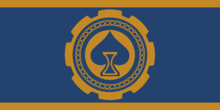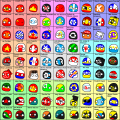(Adding categories) |
imported>TheGhostOfInky m (Removed category) |
||
| Line 99: | Line 99: | ||
[[Category:Economic Systems]] | [[Category:Economic Systems]] | ||
[[Category:Canon ideologies]] | [[Category:Canon ideologies]] | ||
Revision as of 05:44, 10 May 2021
Physiocracy is an economically centre-right ideology which is the child of File:Enlightnenment.png Enlightenment and ![]() Agrarianism.
Physiocracy believes that wealth of nations stems primarily from land agriculture and development and agricultural labour[1], this made them have an important emphasis on productive work as the source of national wealth, which put him at odds with
Agrarianism.
Physiocracy believes that wealth of nations stems primarily from land agriculture and development and agricultural labour[1], this made them have an important emphasis on productive work as the source of national wealth, which put him at odds with ![]() Mercantilism who focused on the ruler's wealth, accumulation of gold, or the balance of trade.
Mercantilism who focused on the ruler's wealth, accumulation of gold, or the balance of trade.
Also, another contrasting point with Mercantilism was that the ![]() Mercantilists believed that the value of the products was created at the point of sale, by the seller exchanging said products for more than the products had been worth before that point, the Physiocrats, on the other hand, held labour as the original source of value.
Mercantilists believed that the value of the products was created at the point of sale, by the seller exchanging said products for more than the products had been worth before that point, the Physiocrats, on the other hand, held labour as the original source of value.
However, for the Physiocrats, this only applied for agricultural labour and agricultural products.[2] All the non-agricultural labour was "unproductive appendage" to agricultural labour.[3]
Physiocracy as a young lad, mostly talked about economics with ![]() his brother and later in his life he became father to
his brother and later in his life he became father to ![]() Georgism.
Georgism.
Other views
The Physiocrats also believed that self-interest drove each segment of the economy to play its role. Although this doesn't mean a person can't labor explicitely for others' benefit instead of one's own, they will work the hardest for their own sake. The system works as a complementary relationship between one person's needs and another person's desires through markets and the free exchange of goods and services, thus, trade restrictions place an unnatural barrier to achieving one's goals.[4]
Physiocrats recognized that capital was key for the production process, and they were proponents of saving some of each year's profits to re-invest on productivity improvements. Capital is also needed to sustain the laborers while they produced. They also recognized that there is opportunity cost and risk involved in using capital for something other than the sole land ownership, thus they believed that interest served a "strategic function in the economy."[5]
Personality
There isn't much of a consensus on Physiocracy's personality besides that he likes to spend his time in the countryside.
How to Draw

Physiocracy is based of the symbol of the New Physiocratic League which is one of the few modern organisation espousing physiocratic principles.
- Draw a ball with eyes.
- (Optional) Draw an Enlightenment Whig.
- Draw a horizontal tricolour of Gold-Dark Blue and Gold again with the dark blue bar being the biggest.
- Draw a Gold circle inside the Blue bar.
- Around the Circle Draw a gear
- Inside the Circle draw a spade in blue.
- Inside the spade in Gold draw a small hourglass.
And you're done.
| Color Name | HEX | RGB | |
|---|---|---|---|
| Dark Blue | #1E406E | 30, 64, 110 | |
| Gold | #C58A20 | 197, 138, 32 | |
Relationships
Friendly
 Classical Liberalism - I like to talk about economics with him, also he helped me raise my kid.
Classical Liberalism - I like to talk about economics with him, also he helped me raise my kid. Georgism - Thank you for carrying on my legacy, kid, and giving me grandkids, but tone down the landlord bashing a little bit...
Georgism - Thank you for carrying on my legacy, kid, and giving me grandkids, but tone down the landlord bashing a little bit...
Mixed
Enemies
 Mercantilism - Damn you and your restrictions on trade!
Mercantilism - Damn you and your restrictions on trade!
Further Information
Literature
- Tableau Economique by Francois Quesnay
- Collection of Quesnay's Writing
- Reflections on the Formation and Distribution of Wealth by Turgot
- The New School of Economics: The Platform and Theory Behind the New Physiocrats by Philip Allan
References
- ↑ "physiocrat" Oxford Dictionaries. Oxford University Press. Retrieved 27 October 2013.
- ↑ Karl Marx and Frederick Engels (1988), pp. 348, 355, 358.
- ↑ Karl Marx and Frederick Engels (1988), pp. 348, 355, 358.
- ↑ Baghdiantz McCabe, Ina (2008). Orientalism in Early Modern France: Eurasian Trade Exoticism and the Ancien Regime. Berg Publishers. pp. 271–72.
- ↑ Henry William Spiegel (1983) The Growth of Economic Thought, Revised and Expanded Edition, Duke University Press. pp. 189, 195–96
Videos
- Quesnay’s 'Tableau Économique' and the problem of rent by UCL Institute for Innovation and Public Purpose
Wikipedia
Online Communities
Gallery
-
Credit:
 TheLegend2T, Source
TheLegend2T, Source
